Reference Letter from Professor
A reference letter from a professor is a crucial document used to support a student's application for educational pursuits, scholarships, research opportunities, or jobs tied to their field of study. This letter holds great significance as it provides a detailed account of the student's abilities, qualities, and achievements. It serves as an endorsement from a respected and knowledgeable authority within the academic realm.
When writing a reference letter, it is essential to include certain key elements. The letter should begin with a formal salutation and an introduction introducing the professor and their role. The letter should clearly state its purpose and explain the relationship between the professor and the student, such as the courses taught, research projects supervised, or any other relevant interactions.
The body of the letter should focus on the student's strengths, skills, and accomplishments. It should highlight their academic achievements, research abilities, critical thinking skills, work ethic, and any other relevant attributes. Concrete examples and specific instances should be included to illustrate these points.
Furthermore, the letter should discuss the student's potential for future success, their personal qualities, and their impact on the academic community. Emphasizing the student's passion for their field of study and their ability to contribute to the respective field is crucial.
In order to write an effective reference letter, the professor should have a comprehensive understanding of the student's academic abilities, personal qualities, and accomplishments. It is important to collect relevant data such as the student's academic transcripts, resume, and any other supporting documents that can support the claims made in the reference letter.
When submitting the reference letter, it is typically requested to be attached as a part of the student's application package. It can be submitted through various methods such as email, online application portals, or traditional mail. It is crucial to ensure that the professor's contact information is provided in the letter for further verification if needed.
Storing the reference letter is important to ensure its availability for future use. Both the professor and the student should retain a copy of the letter for their records. Additionally, it is advisable for the student to store a digital copy of the letter with their other important academic documents.
Sample of Reference Letter from Professor
[Your Name]
[Your Title/Position]
[Your Institution]
[Your Address]
[City, State, ZIP Code]
[Email Address]
[Phone Number]
[Date]To whom it may concern,
I am writing this reference letter on behalf of [Student's Name]. I have had the pleasure of being [Student's Name]'s professor at [Institution] for the past [number] years, during which [he/she] has consistently stood out as an exceptional student.
[Student's Name] has consistently demonstrated great enthusiasm, dedication, and intellectual acumen in all aspects of their studies. In my [courses/lectures/seminars/workshops], [he/she] consistently performed at an outstanding level, which is reflected in their consistently high grades and active participation in class discussions.
One of the qualities that truly sets [Student's Name] apart is their exceptional work ethic. [He/She] consistently went above and beyond the requirements of the course, pushing themselves to explore complex topics and ideas in depth. [Student's Name] exhibited tremendous analytical and critical thinking skills, consistently delivering well-researched and thought-provoking assignments.
Moreover, [Student's Name] possesses excellent communication skills, both oral and written. [He/She] has always expressed ideas articulately and persuasively, whether during class discussions, presentations, or in their written assignments. Additionally, [Student's Name] is a patient listener and demonstrates remarkable teamwork and collaboration skills when working on group projects with fellow students.
Furthermore, [Student's Name] exhibits an admirable passion for their subject matter and a genuine thirst for knowledge. [He/She] has consistently demonstrated a deep understanding of the material covered in the course, but also actively seeks to expand their knowledge beyond the classroom. [Student's Name] has independently pursued additional research and readings, consistently incorporating relevant and cutting-edge information into their coursework.
Throughout my time teaching at [Institution], I have encountered many exceptional students, but [Student's Name] stands out as one of the most impressive individuals I have had the pleasure of instructing. Given their exceptional academic performance, intellectual capabilities, and outstanding character, I have no doubt that [he/she] will contribute significantly to any academic or professional environment they enter.
I wholeheartedly recommend [Student's Name] for any opportunities they pursue, be it further education, internships, or employment. [He/She] has all the qualities necessary to excel and make a positive impact in their chosen field.
If you require any further information or have any specific questions regarding [Student's Name], please do not hesitate to contact me.
Thank you for considering my recommendation.
Sincerely,
[Your Name]
[Your Title/Position]
[Your Institution]
Strengths of a reference letter include its ability to provide an unbiased evaluation of the student's abilities, showcase their potential, and provide an authoritative endorsement. It can significantly enhance the student's chances of securing educational opportunities, scholarships, research positions, or jobs in their chosen field.
However, weaknesses could arise if the professor does not have a deep understanding of the student's abilities or if the letter lacks specifics and fails to provide a comprehensive evaluation. Additionally, it is crucial to acknowledge any potential biases or conflicts of interest that could undermine the credibility of the letter.
Alternative forms of endorsements include recommendation letters from employers, colleagues, or mentors who can attest to the student's professional abilities. These letters serve a similar purpose but focus more on work-related qualities and achievements rather than academic prowess.
The future of the student applying for educational pursuits, scholarships, research opportunities, or jobs can greatly depend on the effectiveness of the reference letter. A strong and convincing letter can open doors to various opportunities and significantly enhance the student's chances of success in their chosen field.
Overall, a well-written reference letter from a professor can be a powerful tool for a student's academic and professional growth. It is essential to approach the task with care and attention to detail, ensuring that the letter effectively highlights the student's abilities and potential for success.

